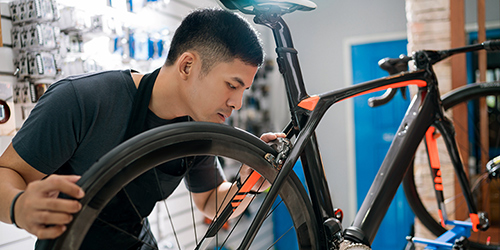You are now reading:
SMEs risk becoming irrelevant if they do not go green
1 of 3



Starting or growing a business? Enjoy more than S$4,000 savings now with essential solutions. T&Cs apply.
Find out more
Your go-to sustainability guide. Get your customised report today by taking the quiz now.
Take the quizyou are in GROUP WHOLESALE BANKING


You are now reading:
SMEs risk becoming irrelevant if they do not go green
Businesses today are making a strong commitment to sustainability, adopting green practices in their corporate strategy to improve brand value, appeal to mindful consumers, improve efficiency and contribute to a better future.
Large companies have been at the forefront of making sustainability a key part of their business, and SMEs are increasingly aware of the importance of doing so. Yet, many are hesitating because of the lack of knowledge and resources to take action.
“SMEs are beginning to prioritise doing so; they’ve started thinking, ‘Look, if we don’t do it right now, we will be irrelevant,” says Mr Eric Lian, UOB’s head of group commercial banking.
‘We are at an inflection point right now, and this is why it is very important for [the SMEs] to not just increase their awareness, but also to put it into action.’
This greater awareness among SMEs comes as their vendors and suppliers increasingly make protecting the environment a part of their business decision, and consumers become more mindful about how products and services are sourced, he explains.
Globally, an urgency to address climate change has led governments to set ambitious targets to reduce carbon emissions. Multinational corporations, which many SMEs supply to, have been looking to decarbonise their supply chains, while more investors want their money to do good.
In Singapore, the Government has doubled down on its efforts by, among other things, launching the Singapore Green Plan 2030 last year that sets out key targets to achieve net zero emissions. It has also introduced various initiatives to nudge companies into making sustainability a business priority.
In his Budget speech this year, Finance Minister Lawrence Wong acknowledged that the journey towards a greener Singapore will not be easy.
“The path towards net zero will entail significant economic restructuring and changes in how we live and work in the future. All of us – the public, businesses, the Government – will face difficult choices. Costly investments may be required, for example, to import or generate low-carbon energy,” he says.
“But now is the time when we must move decisively towards the future of a net zero world. This will allow us to tap fully on the many exciting possibilities in this green transition.”
SMEs are the backbone of the Singapore economy. They make up 99 per cent of businesses, employ 70 per cent of the workforce and contribute roughly half of gross domestic product. They are therefore a crucial force in any country’s green agenda.
According to UOB’s SME Outlook Study 2022, three in five Singapore SMEs believe in the importance of incorporating sustainability practices in their businesses – but they face challenges in implementing sustainable practices.
Top hurdles cited by SMEs include insufficient knowledge to identify and to execute relevant initiatives, as well as inadequate financial and non-financial support such as sustainability training, the study found.

Mr Eric Lian, UOB’s head of group commercial banking. PHOTO: UOB
As the largest SME bank in Singapore, UOB is well-placed to help businesses overcome those challenges, says Mr Lian. The bank has a strong track record of supporting companies from different industries and of various sizes in their sustainability journey, he adds.
One local SME that UOB has worked with is energy services firm Measurement & Verification (M&V), which was involved in a project to upgrade Changi Airport’s air-conditioning system. M&V’s energy-efficient solutions could help the airport save about 15.8 gigawatt-hours (GWh) per year, which would translate to an estimated S$3 million savings in utility bills.
M&V tapped UOB’s financing package under the Enterprise Financing Scheme Green, which supports technologies and solutions to reduce waste, resource use or greenhouse gas emissions. Under the scheme, Enterprise Singapore shares 70 per cent of the risk with partner financial institutions.
It is not just companies providing sustainable products and services that benefit from UOB’s support. Mewah International, a company that refines and manufactures palm oil products, is one company from a “traditional” sector that the bank has worked with.
Mr Lian shares that Mewah’s management takes sustainability seriously because they know that customers care about the environmental impact of their purchases. In February, the company received a US$25 million (S$34 million) loan under UOB’s Green and Sustainable Trade Finance Framework – which it plans to use to buy and sell internationally certified sustainable palm products.
Overall, UOB aims to make sustainability and the access to sustainable financing simple for SMEs. Mr Lian says that starts with having conversations with companies to understand their goals and challenges on a regular basis.
“When we talk to our clients, we ask them ... are your customers expecting you to be sustainable? Are your vendors? Are your suppliers? Are you representing a brand that prioritises sustainability? If you’re not yet there, what are you doing about it?” he says.

With more companies aligning their goals with Singapore’s Green Plan 2030, UOB wants to help SMEs forge a resilient, financially viable, and socially and environmentally responsible business. PHOTO: GETTY IMAGES
Taking a “holistic” approach in supporting SMEs, UOB thus makes it a point to go beyond providing green loans and sustainable financing.
First, the bank offers advice on sustainability related enquiries, and guides businesses on the criteria required to qualify for the relevant green certifications according to industry standards. The bank also works with them to explore how they can qualify for sustainable financing.
Second, UOB has various sustainable finance frameworks to help companies assess their needs, and defray costs associated with independent verification. The frameworks currently support companies from a wide range of sectors – including building construction, waste management and transport – and will likely be expanded to cover more industries.
If SMEs do not fit into any of the existing frameworks, the bank will direct them to the right platform. UOB has a close working relationship with various government agencies, and it can help SMEs to get the support they need.
For companies that are not ready to move ahead with their sustainability plans, the bank offers financing that comes with requirements to hit certain sustainability milestones within a specific timeframe. That will help to ease SMEs’ green transition, explains Mr Lian.
Third, UOB’s vast network of clients in Singapore and the region means it can connect SMEs with partners in their sustainability journey. Last year, the bank launched U-Drive, which connects players in the electric vehicle ecosystem such as automobile brand owners, car dealers, charging point operators and end users.
Another example is the U-Energy platform that connects energy service companies to businesses keen to take on energy efficiency projects to reduce energy consumption.
Over the years, sustainability has moved from being a buzzword and concept to being a core component of business strategy, Mr Lian points out. The focus on sustainability by governments, businesses and consumers will only grow and the cost of ignoring it has become larger.
“The risk of being excluded and losing revenue is much higher right now. So there is an urgency for [SMEs] to start thinking about it,” he says.
“We don’t want to just be a banker to them, we want to be their partner.”
This article was originally published in The Straits Times on 11 April 2022

Start your UOB eBusiness account today, and enjoy zero fees* and more than S$500 of annual savings on FAST and GIRO transaction fees.

17 Sep 2025 • 5 mins read

19 Apr 2023 • 3 mins read

26 Oct 2022 • 3 mins watch time